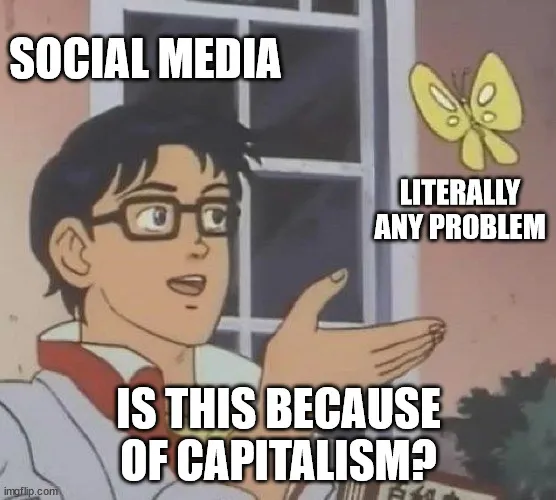I have some left-leaning acquaintances in real life and on web2.0 social media. One of my deep frustrations is their tendency to use "capitalism" as a meaningless catch-all term for "things in society I dislike." They also ascribe to "capitalism" any number of irrelevant or nonsensical premises, means, ends, and moral positions. Is there a problem? Something vague called "capitalism" is to blame, for sure.

Made on imgflip based on this meme template
Is there an industry rife with subsidies, bailouts, regulatory capture, and incestuous political connections? "See? Free markets failed! This is why we need more government regulation and oversight."
Are workers struggling with inflation, taxation, bureaucratic red tape, and other roadblocks to entrepreneurial activity? "That's capitalism for ya. We need universal healthcare and a guaranteed basic income, obviously."
Are people pointing out that mega-corporations sidestep the market through political favors and tax-funded subsides? "That's just what a laissez-faire system does. It leads to fascism."
Seriously, every single inconvenience or injustice in life seems to be the fault of some nebulous "capitalism" bogeyman. But if you ask them for a definition of capitalism, they clearly don't have any grasp of economics, philosophy, history, or basic logic. We live in a capitalist society because that is what we all learned in school. Government is mostly good, except when the wrong people get elected, because democracy is good except when the proper people disagree with the outcome. Freedom is dangerous, unless you agree with whatever the latest in vogue thing is. If we just institute a centrally-planned economy with cradle-to-grave welfare with social credit scores and surveillance of everything, we will finally be free!
I know the previous paragraph is an exaggerated conglomeration instead of a rigorous analysis, but this is a rant, not a formal treatise. Besides, it's not much of an exaggeration. If you've been involved in discussions of politics and economics, you've certainly seen these sentiments as people settle into partisan tribalism instead of trying to seriously examine the problems at hand. I'd like to think this is just edgelord keyboard warriors, but it's like trying to discuss geography with a flat-earth believer. At least flat-earthers aren't threatening me with exile, gulags, or execution should they achieve power.
Meanwhile, in the real world, no major party truly supports free trade and voluntary association. They agree we need supervision because government goons are magically imbued with superior wisdom and virtue to guide us despite all the evidence of history and current events. We are at a turning point. I don't guarantee collapse tomorrow, but the status quo is definitely unsustainable. The socially acceptable scapegoat is capitalism, but I lay most of the blame at the feet of those who claim political power. Will we as individuals and members of society respond by pursuing freedom, or push toward authoritarianism with its veneer of security despite guaranteeing only violence against nonconformists?
I'm not sure the word "capitalism" can be defined as a useful term for civil discourse anymore. It has been used to describe so many contradictory ideas, some so pervasively that no meaningful conversation can be had. Feel free to offer your own definition in the comments, and hash out your differences with people who disagree. Just please be polite.
A society built on property rights as defined by homesteading and voluntary exchange (in contrast to land grants, licenses, and titles from political authority) necessarily relies on consent as people choose for themselves what means best satisfy their own ends. There is nothing in free market philosophy precluding voluntary communes, mutual-aid societies, charity, or any other freely-chosen use of your life and property. There is also nothing mandating exploitation, abuse, or deception as caricatured by many critics. In fact, the openness of prices and consumer reviews tends to allow people opportunities to choose better. When people can make informed choices, there are real penalties for misbehavior in contrast to the stagnation and abuse prevalent in mandated exchanges with government and being restricted to their crony corporations.
If central planning schemes are so good, why must they be imposed upon others? Lead by example, show it works on a small scale, and don't coerce others. Good ideas don't require violence against peaceful dissenters. That is why free-ish markets have done more to fight poverty in spite of constraints and human error than all the government programs and handouts through history. We may never have had truly free markets before in human history, and we may never achieve them in the future, but trade and ownership are what build prosperity while allowing individuals to flourish.
